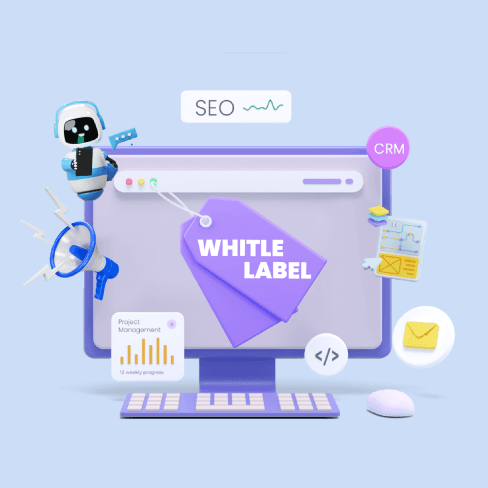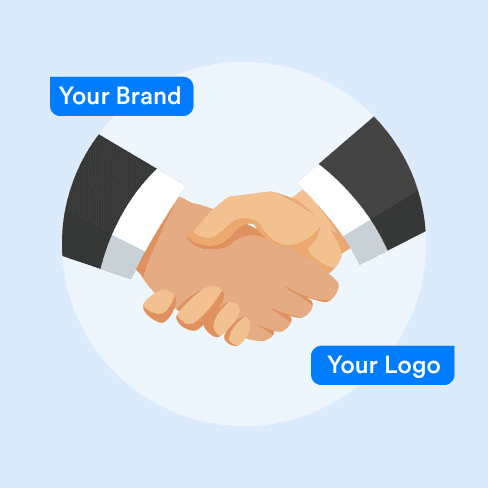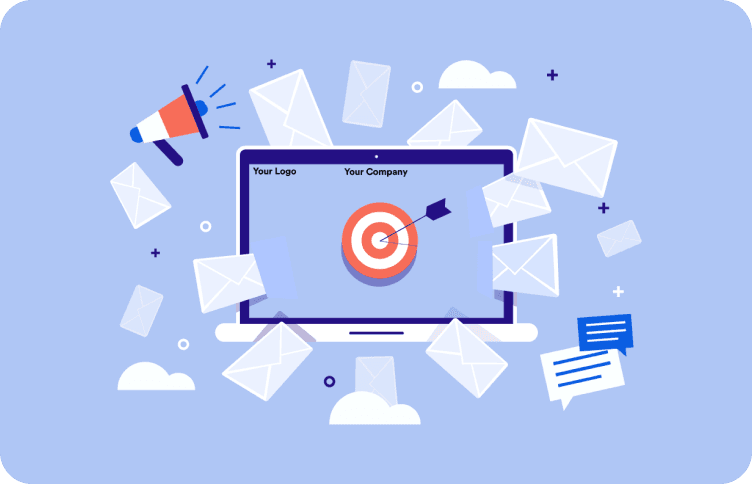White Label /
13 Min read
White Label Partnerships in 2024: Types, Benefits, and Best Practices
May 4, 2023

Bhavyadeep Sinh Rathod
Content Editor, WotNot
You might have heard the term white label partnerships a lot of time and are probably wondering what it exactly means. Well, you have landed at the right place to get your answer. Through this article, we bring an ultimate guide on white label partnerships where we will discuss:
What Does White Label Partnerships Means?
What Are the Different Types of White Label Partnerships?
How to Choose the Right White Label Partner
Top Benefits of White Label Partnerships
Top Challenges of White Label Partnerships
What Are White Label Partnership Agreements?
White label partnerships are a business practice involving two companies where one company creates a product or service and allows the other company to sell that product or services under their own brand name and logo. This practice is sometimes also referred to as a private label or reseller program.
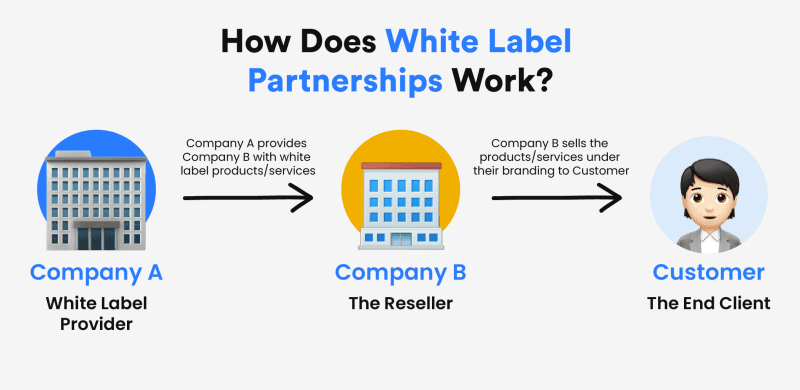
Let’s take an example to understand it easily.
Assume there are three companies:
A: - The company that supplies white label product/service
B: - The company that resells that product/service under their brand name
C: - Client of company B or the end client that receives the white labeled product/ service from company B
Here, company A and company B enter into a white label partnership where A allows B to sell their product/service to C under B’s branding and logo.
This practice is quite common in all walks of business including the digital world. In recent years, there has been a boom in the adoption of white label reseller programs by many growing companies. It is because companies have realized that white label partnerships allow them to grow rapidly and tap a wider customer base at minimal risk.
Types of White Label Partnerships
Ok, so we just understood how white label partnerships work. Now, let’s explore what are the different types of white label partnerships.
1. Based on Business Models
a. Reseller Model
This is one of the most common types of white label partnerships where one company develops a product, keeps its ownership, and allows another company to sell it under their brand. Reseller model is also generally known as white labeling. This type of partnership is quite prevalent in the B2B product and services landscape where there is a need for significant investment in sales collateral.
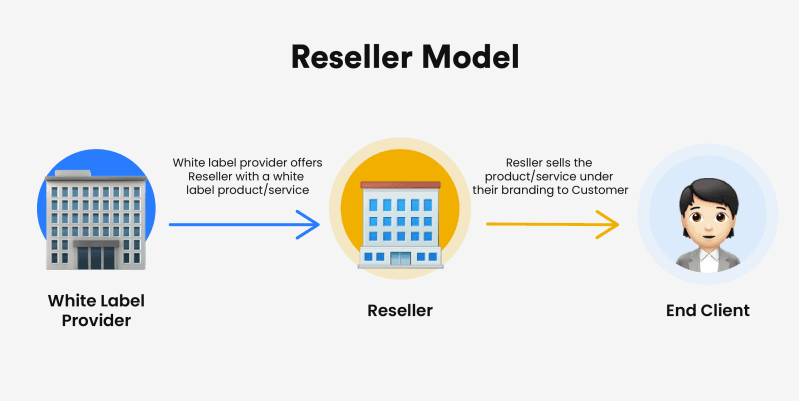
For example, WotNot offers white label chatbot. Now, anyone can sell these chatbots under their brand name to their clients. In this particular case, they are also referred to as chatbot resellers as they are literally reselling chatbots to their clients.
b. Product Co-creation
In product co-creation white label partnership, two companies work together to create an exclusive product that would be sold under only one brand name. Here, both the involved companies own the product. However, the company with major contribution in the development acts as a leading brand and gets the rights to sell the product under their branding.
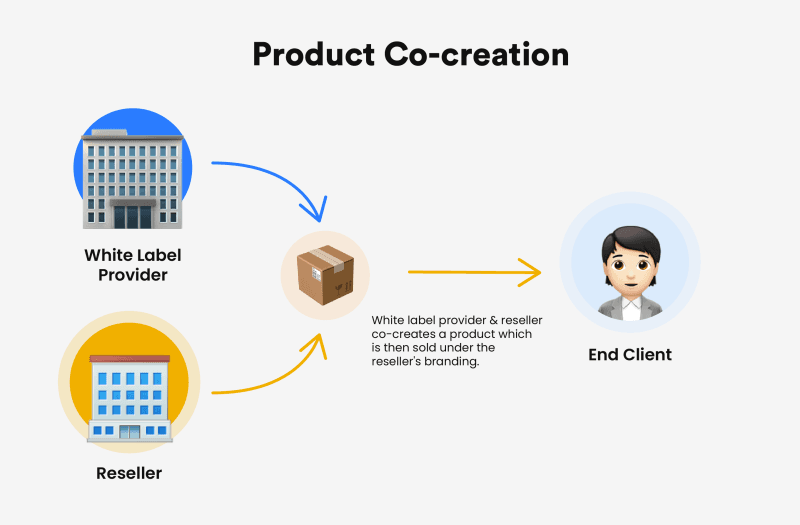
Amazon’s partnership with brands like Mattel and Hasbro is a great example to understand this white label partnership. Amazon has partnered with these two brands to produce exclusive products for its marketplace. With this partnership, Mattel and Hasbro get access to the large customer base of Amazon. And in return, Amazon gets intellectual property of both the brands.
2. Based on Product/Service
a. Product White Labeling
This is quite self explanatory. White label digital products mainly refers to software or hardware products that are built by one company and are sold by other companies under their own name and branding.
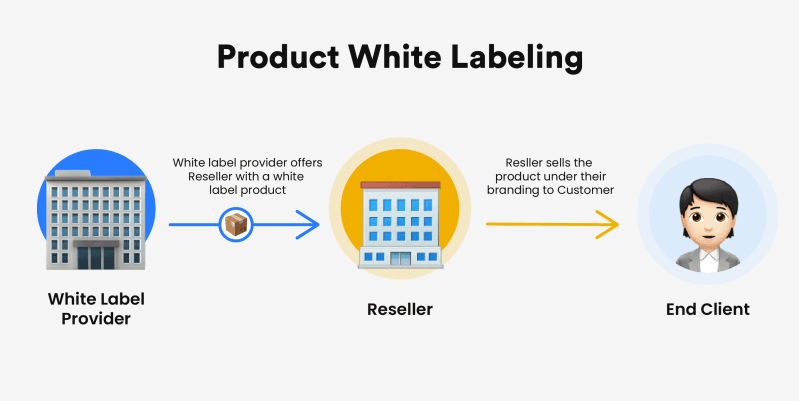
The pricing structure of white label products depends on several factors like product, industry, and specific agreements.
For white label SaaS products, the subscription model is quite prevalent.
Other pricing models include:
Per-unit pricing
Revenue sharing pricing
Custom pricing
b. Service
White label services in the digital realm mean that a company provides a service and allows another company to sell that service under their own branding.
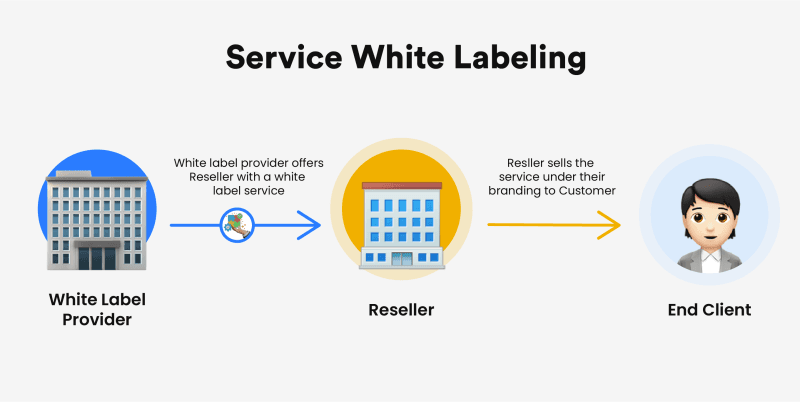
To understand, let’s take an example. Company A offers website development services and allows company B to market and sell those services under their own brand. This way company B can offer website development services to their clients without having any required expertise or resources.
The white label partnerships for products and services are identical and the only difference lies in the fact if the thing white labeled is a product or a service.
3. Based on Partnership Structure
a. Exclusive White Labeling
An exclusive white label agreement means that the reseller is exclusively authorized to sell the product or service within a specific industry sector or a geographic area. This means no one other than the reseller can sell the same service or product in that geography or industry.
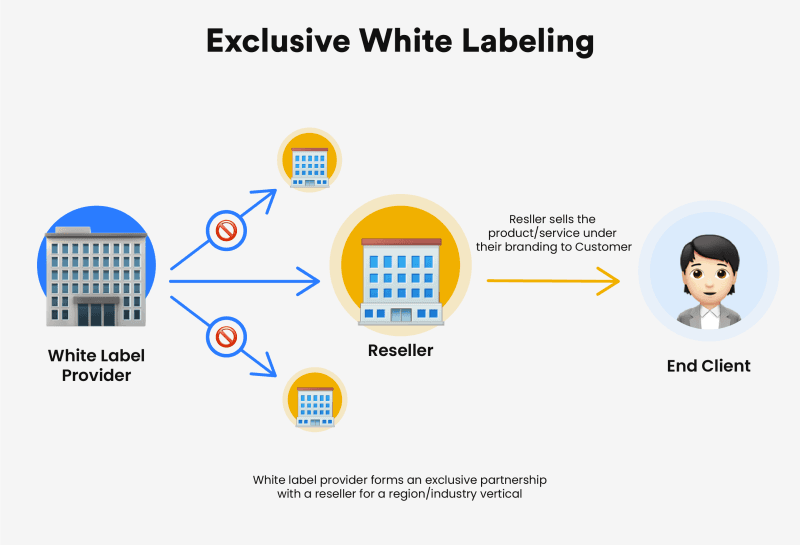
The exclusive nature of this white label partnership makes the agreement expensive for the reseller. But, it also provides a greater deal of control and a higher level of differentiation in the market.
b. Non-Exclusive White Labeling
In this white label partnership agreement, more than one company can sell the same service or product under their branding in the same geographic area and industry. These agreements are way less expensive than their exclusive counterparts.
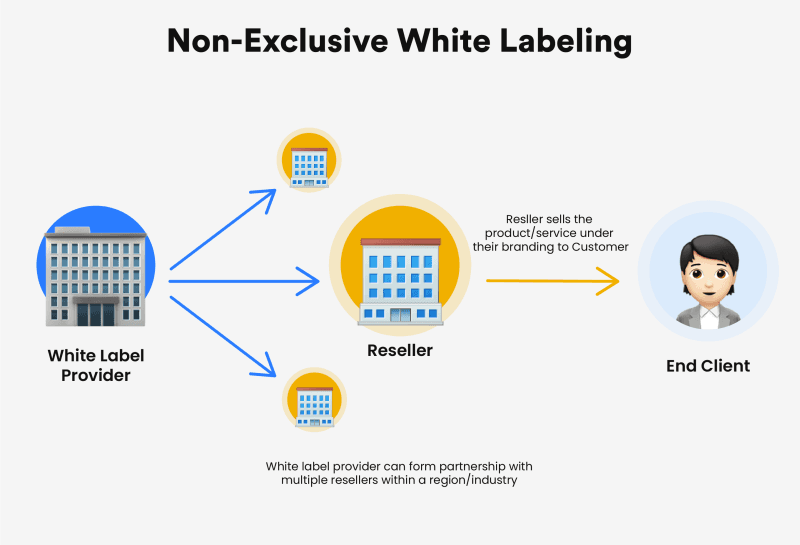
However, multiple companies selling the same product or service offers less control over the product. In addition, it may also lead to greater competition in the market.
4. Based on Level of Transparency and Involvement
a. Closed White Label
In closed white label partnerships, a business signs a contract with both the white label partner and the end client. Here, the end client will never get to know the fact that a white label partner is working behind the scenes. The white label partner never contacts the end client directly or even reveals their presence in the services. To further protect the data of the end client, both white label partner and the reseller business signs an NDA.
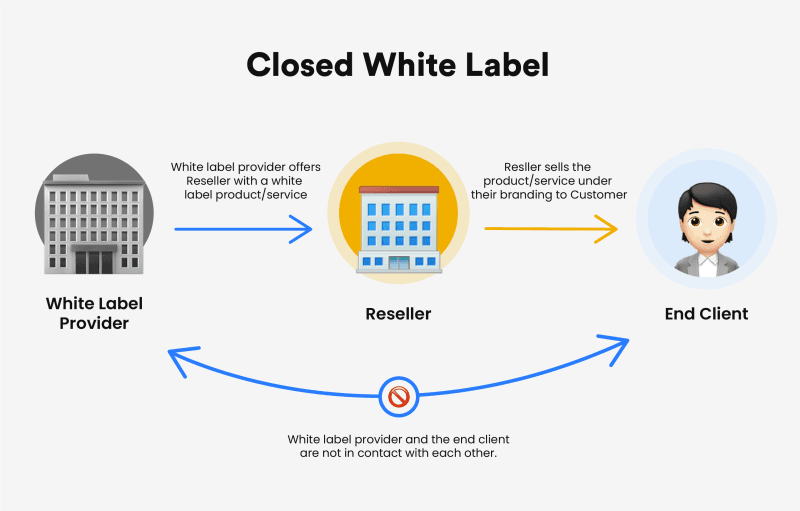
Let’s take an example to understand this better.
Imagine you are a company that offers lead generation services. You have a client, who approached you for a live chat tool. Now, you don’t have a live chat tool. But you can’t just say no to your client. Instead, you can look for a white label live chat software provider.
Here, the white label live chat providers will allow you to offer the live chat under your branding. This way, you will be able to fulfill your client’s demand without even them knowing that actually someone else did it for you.
b. Open White Label
In open white label partnerships, the end client is aware of white label partner’s existence. Here, you act as a mediator between the end client and the white label partner. The entire process is carried out with utmost transparency.
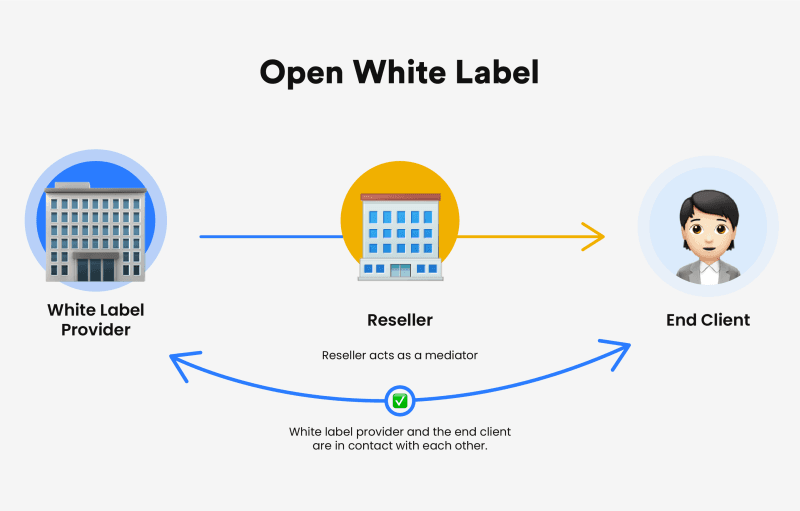
This model is ideal when your client is looking for services that don't fall under your area of expertise. In such scenarios, you can partner with white label agencies to offer the said services and that too under your brand name.
c. Endorsed Providers
This type of white label partnership agreement is similar to open white label partnership. In this, both the white label partner and the end client have a contract. In this mode of partnership, you act as a mediator between the end client and the white label agency.
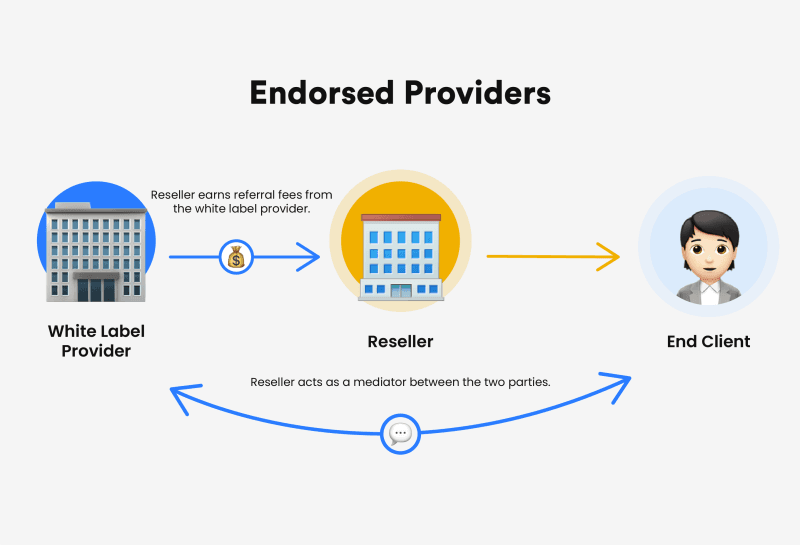
You as a mediator get an opportunity to earn referral fees from the white label agency. Similarly, a white label agency will benefit by getting more clients. And at last, the end client will get services from an experienced agency that will deliver top-notch results.
How to Choose the Right White Label Partner
A white label partnership is not a short term affair. This partnership is a long-term journey and for that you must choose a white label partner that fits your requirement. How to do that? Go through the below points where we have explained top factors that you should consider while choosing a white label partner.
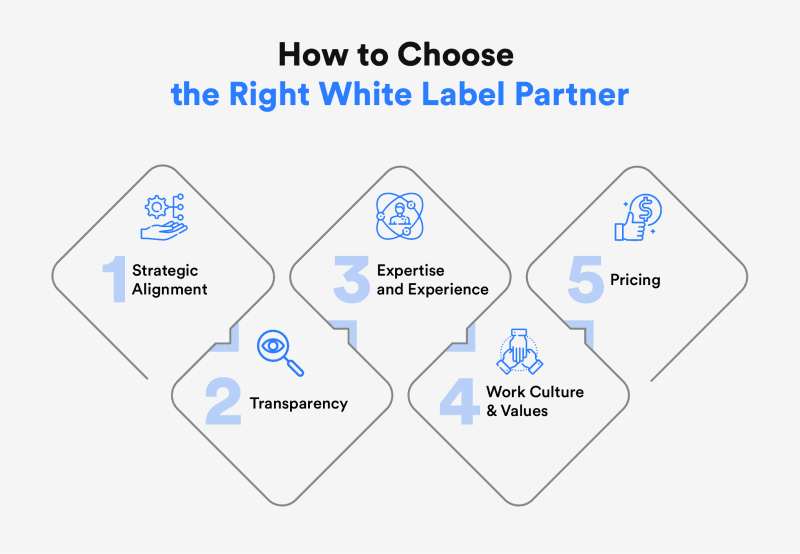
1. Strategic Alignment
Any kind of partnership will end in a disaster if their goals are not aligned. This is true for white label partnerships as well. That’s why it becomes imperative that you focus on strategic alignment of your business and the white label partner.
To identify strategic alignment, you can:
Prioritize strategic alignment at the beginning to make implementation smooth
Have comprehensive discussions to identify strategic opportunities that benefit both parties
Ensure that the white label partner caters to your clients' specific use cases for which the clients are willing to pay a premium
Discuss the agency's long-term intentions and product roadmap to gauge alignment
2. Transparency
Transparency is an important factor to consider while choosing a white label partner. Transparency ensures that your white label partner will deliver your client’s requirements effectively. Below are some more reasons that make transparency a must have for your white label partner.
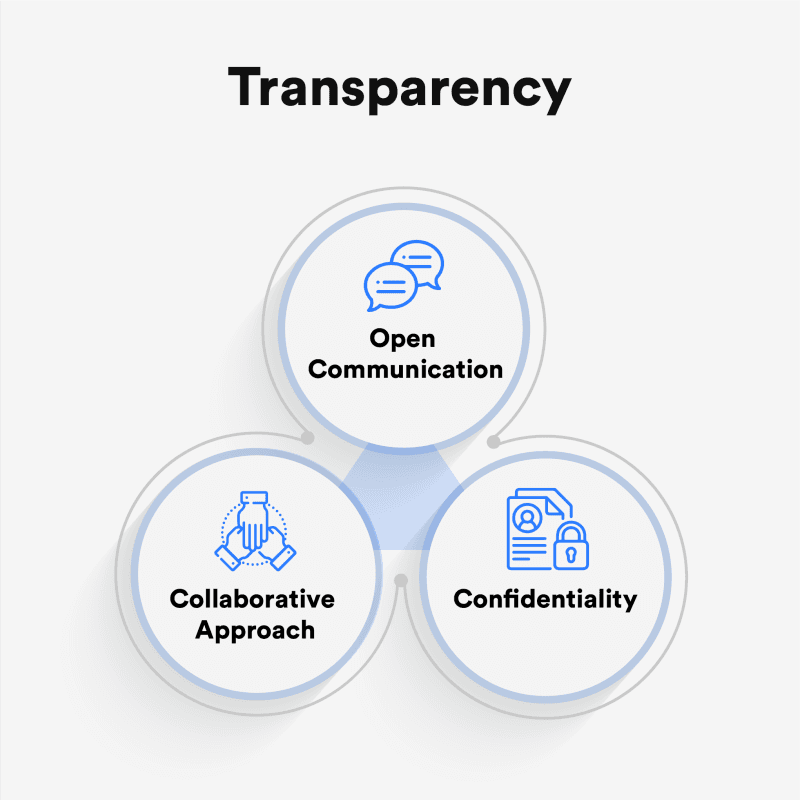
a. Open Communication
A transparent white label partner will communicate openly and honestly about their expertise, experience, and capabilities. This helps build trust in your white label partner’s ability to fulfill your client’s requirement.
b. Collaborative Approach
If a white label partner is transparent, it also means that they will show a collaborative approach. They will involve you in every update, changes, decisions, and progress reports, ensuring that your client gets the best service possible.
c. Confidentiality
A trustworthy and transparent partner offers clear and concise agreements that include all the responsibilities and obligations of the parties involved. This transparent approach eliminates risk of miscommunication, misunderstandings, or confidentiality breaches.
3. Expertise and Experience
While choosing a white label partner for your business, it is important to evaluate their expertise and experience. Here, expertise refers to the white label partner’s genuine knowledge and skills in a specific field, allowing them to perform tasks with exceptional quality and achieve desired outcomes.
A white label partner with a dedicated team of experts can help you meet all of your customer's requirements without ever having to say "No."
You can evaluate the expertise and experience of a white label company with the following steps:
Check their track record
Check their references and testimonials from past clients
Examine the company profile, the industries they serve, and the locations they operate in
Have an in-depth conversations with them to gauge their level of specialty knowledge
Determine whether they are constantly innovating its solutions to stay ahead of the curve
Check if they have a network of trusted tech and media partners
4. Work Culture & Values
Work culture and values are quite underrated but an important factor while choosing a white label partner. For this, you have to go beyond just the product or services offered by the white label partner. You have to examine a lot of key things that are mentioned below.
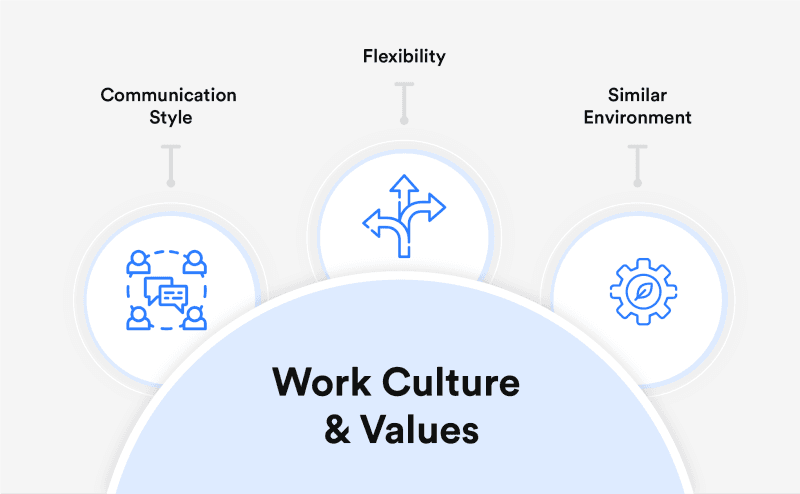
a. Communication Style
Find a white label partner that communicates in a way that aligns with your organization's style. Find out if they use formal policies and procedures, or are they more fluid in their approach? Aligned communication styles can eliminate chaos and miscommunication.
b. Flexibility
A white label partner should be flexible in adapting to your business needs. This becomes crucial especially when you have unique or out-of-the-box requirements. It's important to find a partner who is willing to work with you to achieve your goals.
c. Similar Environment
Finding a partner that is in a similar position to your organization can be beneficial. Agencies of similar size or with a similar entrepreneurial environment may be better suited to work with your business.
5. Pricing
Never forget to consider pricing structure while choosing your white label partner. The pricing includes several components that you must clearly understand.
Here’s the list of things you need to look for.
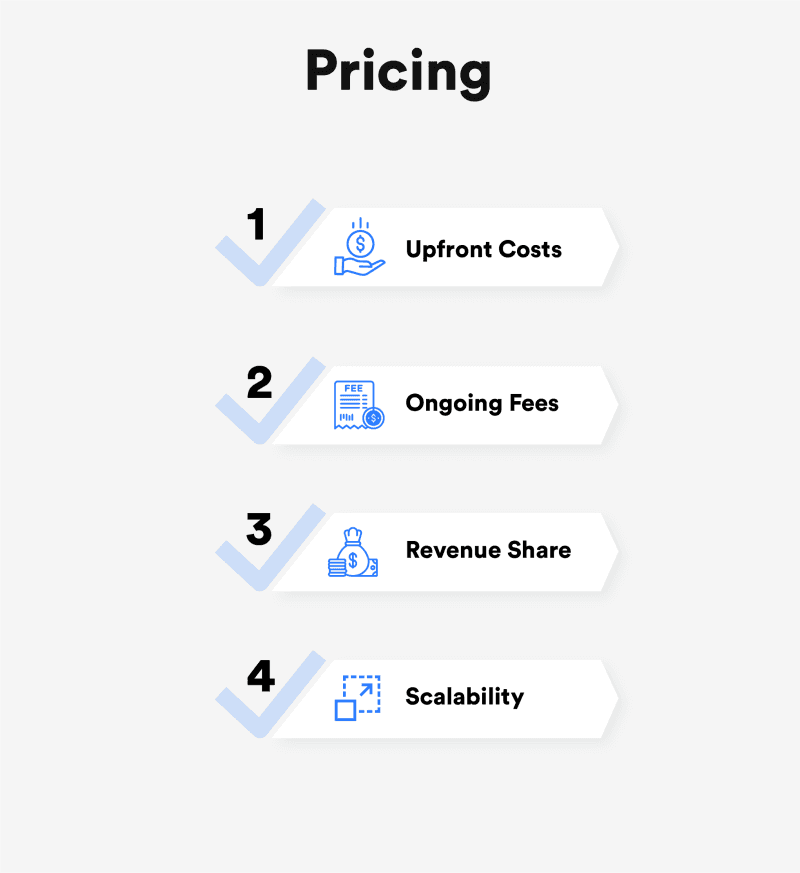
a. Upfront Costs
Find out about all the upfront costs including the setup fees, integration costs, and any other miscellaneous upfront costs. Ensure that they are well within your budget.
b. Ongoing Fees
Get to know how ongoing fees are calculated. Find out if there is a flat rate or is the calculation based on the usage. Ensure that these are reasonable and don't put a dent on your purse.
c. Revenue Share
Some white label partners also take a percentage of revenue generated from their services or products. Ensure if your white label partner also takes their revenue share. And if yes, find out if it's a fair split and more importantly does that arrangement work for you.
d. Scalability
The pricing structure should be scalable enough to accommodate all your growing needs, ensuring that it isn’t cost-prohibitive.
Top 5 Benefits of White Label Partnership
There are many reasons why one should opt for white label partnerships. Here, we have listed the top 5 benefits you’ll enjoy with your white label partnership.
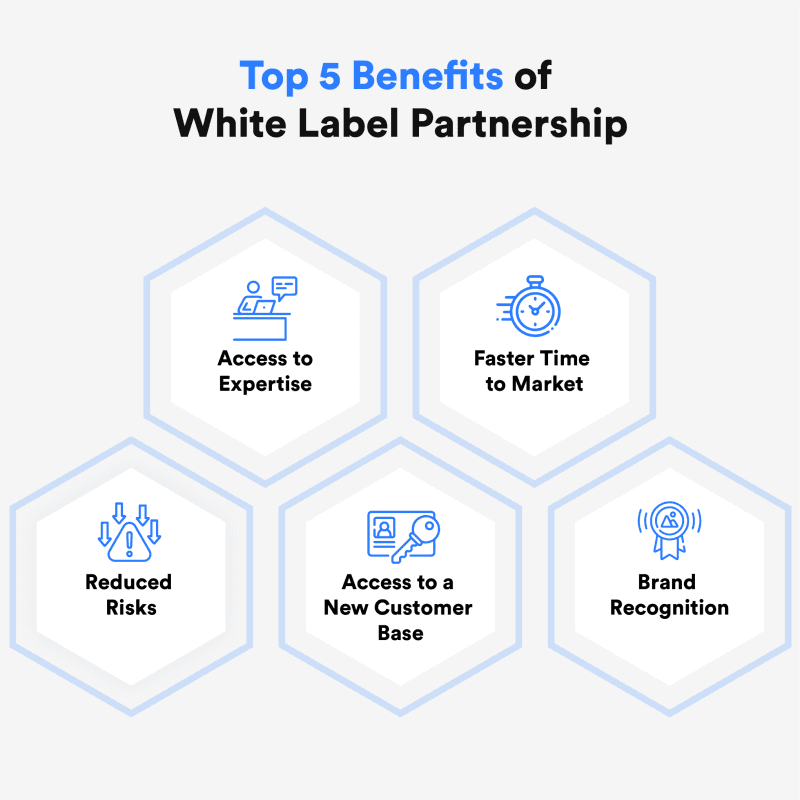
1. Access to Expertise
White label partner programs provide an effective solution for businesses to access expertise they don't have in-house. By partnering with a white label provider, businesses can take on new projects outside their team's expertise and deliver high-quality solutions to clients.
For instance, a digital marketing agency can add white label marketing tools to its suite of offerings. With this, they can:
Expand their offerings
Say yes to all their client requests
Maintain control over the branding and customer experience
Eliminate the need to hire additional resources
Also Read: Why Marketing Agencies Must Go for White label Chatbots?
2. Faster Time to Market
In a highly competitive and volatile market, being able to launch new products or services quickly can be the difference between success and failure. By leveraging a white label partner's existing infrastructure and expertise, businesses can deliver new offerings to the market faster and with fewer resources.
Another scenario where faster time to market is critical when businesses try to gain a first-mover advantage or respond quickly to changing market conditions. With white label, businesses can hit the market quickly and effectively, without the need for additional time or resources.
This gives them a significant competitive edge, allowing them to capture market share and build a reputation for delivering high-quality solutions on time.
Partnering with a white label provider can be a game-changer for businesses seeking faster time to market.
3. Reduced Risks
White label partnerships can help businesses reduce risks considerably. With a white label partnership, businesses can access their white label partner’s expertise and resources. This means the businesses don't have to invest a significant amount of time and money into developing certain services or functions themselves.
The white label partner also comes with ready to use and tested products or services, so the business doesn't have to worry about investing in something untested and unreliable. This reduces the risk of investing in something that might not work.
4. Access to a New Customer Base
White label partnership opens up so many opportunities in the form of new markets and customers which you wouldn’t have been able to access otherwise. This also opens up opportunities to cross-sell where you can pitch your own product or services to the clients you got from the white label partnerships.
This partnership enables you to leverage your white label partner’s teams, resources, and networks to gain tremendous benefits.
5. Brand Recognition
White label partnerships allow you to boost your brand’s visibility by many folds. Here, you can get a ready-made product or a reputed service, and offer it to your clients under your branding. This means, you can offer a wide range of products under your brand.
For example, a digital marketing agency can white label SMS marketing, social media marketing, or SEO services of another company under their own brand name.
When you white label a product or service, your brand name is attached to every aspect of it, including packaging, marketing materials, and the customer experience. This helps customers become familiar with your brand and builds loyalty.
By offering multiple white label products or services, your brand gets more visibility, which can lead to more customers and more business. This makes it easier for businesses to promote their brand name without being too pushy.
Top 4 Potential Challenges of White Label Partnerships
White label partnerships are great, but it does have its share of challenges. Here are some of the major challenges that you may face in your white label partnership.
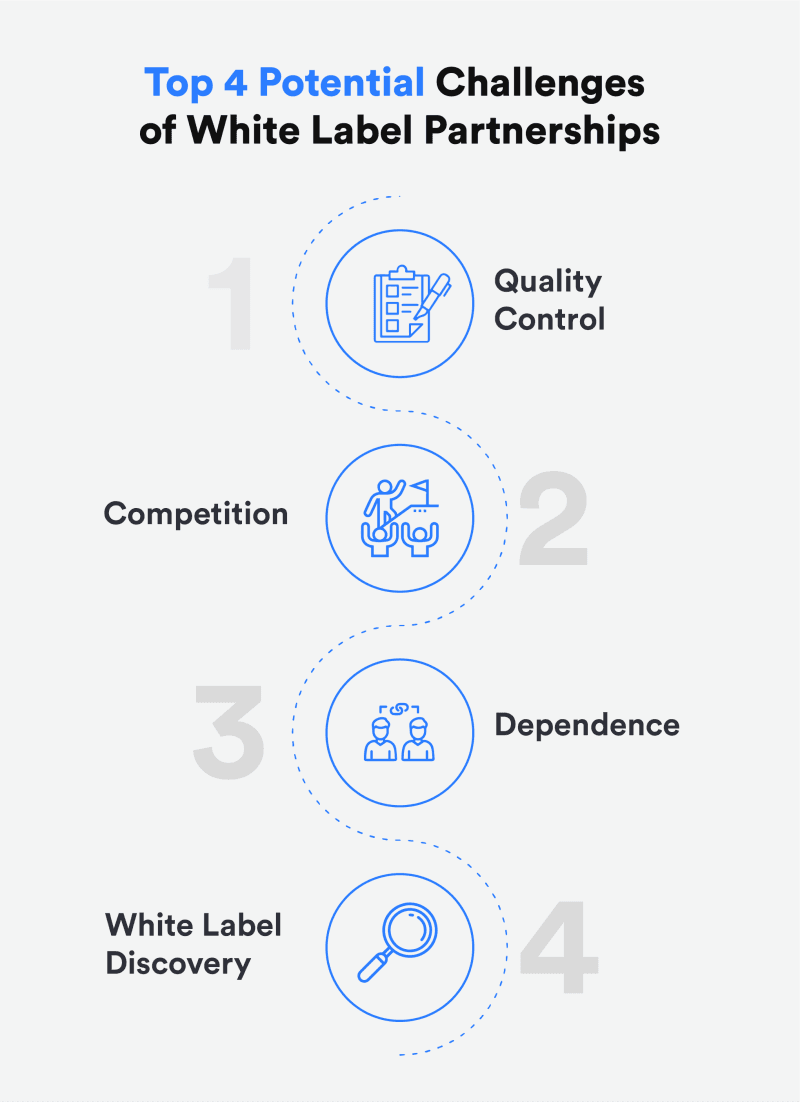
1. Quality Control
Getting a quality product under your branding is one of the biggest advantages of a white label partnership. But it can be a double edged sword if the quality of the product is not up to the mark. In that case, your brand will bear the brunt of the poor quality delivered by your white label partner. That’s why it becomes crucial to test the quality of the product and the service before you proceed with the white label partnership agreement.
2. Competition
Things can go south pretty quickly if your white label partner decides to work with your competitor. This can easily result in:
Conflict of interest
Deprioritization
3. Dependence
In a white label partnership, you are heavily dependent on your partner. If your partner faces any issues or in the worst case scenario goes out of business, it can lead you to miss your commitments to your clients. This can be detrimental to your brand’s reputation.
4. White Label Discovery
There’s always a risk of your clients finding out about the white label partnership. This risk increases if the product has some easily identifiable features. This discovery can make you look non-creative and lacking originality. And I am sure, that’s not the impression you want your clients to have about you.
Conclusion
That was all you needed to know about white label partnerships. I hope this article helped you to understand everything that there is to know about white label partnerships. Now, if you are ready to start your white label partnership, do your research and find the best suitable white label partner for your business. Start by choosing the type of white label partnership that suits you. Consider all the factors that we listed above to choose your white label partner. And prepare for all the white label partnership challenges that may arise in the process.
And if you are looking for a white label chatbot or a live chat, you can simply choose WotNot which is the best white label chatbot provider. For more information, you can contact us or schedule a demo.
ABOUT AUTHOR
Bhavyadeep Sinh Rathod
Content Editor, WotNot
He likes technology, chatbots, comedy, philosophy, and sports. He often cracks hilarious jokes and lightens everyone's mood in the team.

